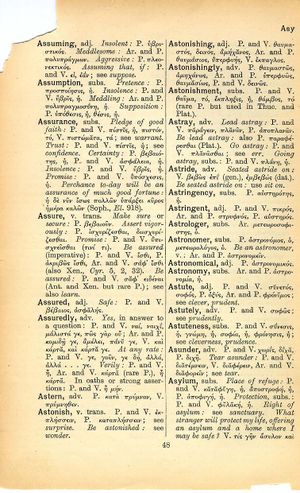astray: Difference between revisions
From LSJ
Πολλοῖς ὁ Δαίμων, οὐ κατ' εὔνοιαν φέρων, / Μεγάλα δίδωσιν εὐτυχήματ' ... (Euripides) → God brings great good fortune to many, not out of good will,...
(CSV3) |
m (Woodhouse1 replacement) |
||
| Line 1: | Line 1: | ||
{{Woodhouse1 | {{Woodhouse1 | ||
|Text=[[File:woodhouse_48.jpg|thumb|link={{filepath:woodhouse_48.jpg}}]] | |Text=[[File:woodhouse_48.jpg|thumb|link={{filepath:woodhouse_48.jpg}}]] | ||
===adverb=== | |||
[[lead astray]]: [[prose|P.]] and [[verse|V.]] [[παράγειν]], [[πλανᾶν]], [[prose|P.]] [[ἀποπλανᾶν]]. | |||
[[be lead astray]]: also [[prose|P.]] [[παραφέρεσθαι]] ([[Plato]]). | |||
[[go astray]]: [[prose|P.]] and [[verse|V.]] [[πλανᾶσθαι]]; see [[err]]. | |||
[[going astray]], subs.: [[prose|P.]] and [[verse|V.]] [[πλάνη]], ἡ. | |||
}} | }} | ||
Revision as of 08:56, 20 May 2020
English > Greek (Woodhouse)
adverb
lead astray: P. and V. παράγειν, πλανᾶν, P. ἀποπλανᾶν.
be lead astray: also P. παραφέρεσθαι (Plato).
go astray: P. and V. πλανᾶσθαι; see err.
going astray, subs.: P. and V. πλάνη, ἡ.

